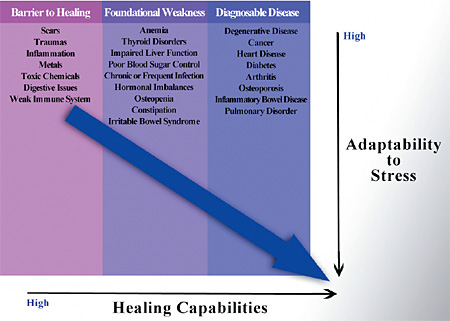 |
|
| ||||||||
|
|
|
December, 2011 The Herbal Medicine DynamicBy Jeannette Birnbach, MS, DC, CCN Chiropractors are well aware of the seriousness of the health landscape in the latter part of the 20th century and the epidemic of chronic disease that most of our patients face. Dorland's Illustrated Medical Dictionary states chronic disease "is slow in its progress and long in its continuance." It may take years before the multifactorial causes of a disease have taken effect and the individual receives a diagnosis. One of our greatest tools for intervening during the years that chronic disease is developing is herbal medicine. With skillfully applied herbal protocols, the clinician can assist the patient to slow or even reverse the degeneration that is the hallmark of chronic conditions. I use the chart below in my clinic during office visits to illustrate the progression of the disease process, starting with symptoms all the way to diagnosable disease. It's usually easy for patients to find themselves on this diagram. As the health conditions listed become more serious from left to right, we see that this corresponds to decreased adaptability to stress, and decreased healing capabilities.

In 1910, D.D. Palmer stated that the determining causes of disease were trauma (mechanical stress); poison (toxins, nutritional deficiencies); and autosuggestion (stress). Chiropractors are experts at handling the mechanical aspects of disease but if the "poisons/nutritional deficiencies" aspect of ill health is not handled, the healing process may be slowed or not happen at all, even if you deliver the correct adjustments. The ability of the body to respond to demands including detoxification, trauma, stress, etc depends on its ability to regulate and prioritize these functions. Likewise, the ability of the body to utilize for healing purposes quality food, sleep, and Chiropractic adjustments also depends on its ability to regulate itself. When the body is overwhelmed by toxins and stress, it can move into a state of "blocked regulation" and cease to respond appropriately to even the correct healing therapies. Herbal medicines are one of the fastest ways to restore regulation to the nervous system. Inflammatory Response All chiropractors know that it's crucial to control the inflammatory response in both the acute and chronic phases of care in order to achieve the best outcome for the patient. Inflammation speeds the degeneration process and if chronic or severe enough may render the patient unable to tolerate an adjustment. The addition of anti-inflammatory herbs like Boswellia, antioxidants like Quercetin and enzymes like Bromelain offer safe, non-chemical pain relief and have virtually no contraindications. Now let's look at just one type of inflammation that can be slow and insidious and sometimes have no symptoms at all. Irritable Bowel Syndrome (IBS) is the most commonly diagnosed digestive disorder, with symptoms ranging from heartburn to constipation. IBS creates constant stress on their adrenals, liver, brain and other organs due to the inflammatory process and production of endotoxins. Let's add a bad diet, stress at work, over-indulgence in alcohol and inadequate sleep and exercise. Is a patient like this likely to receive all possible benefit from an adjustment? The efficacy and safety of herbal medicines when applied correctly has led many Chiropractors to at least consider adding these supportive protocols to their treatment plans, but the confusion about how to go about this prevents many doctors from taking action. If you map out the addition of herbal medicine to your practice and take these recommended steps, the transition will go smoothly. Learn the Scope of Practice in Your State Your state board of Chiropractic will have clear guidelines on the scope of practice in your state with regard to using herbal supplements in clinical practice. Make sure that you have a clear understanding of these laws. Decide before you introduce herbal medicine to your patients the extent of nutritional support that you would like to offer or focus on. For example, you may decide that you only want to provide anti-inflammatory and musculoskeletal support. That's fine, and you'll do your patients a world of good if you become an expert in just this one area. You may decide you want to add digestive support, and/or nutritional support to help patients sleep better or improve their immune systems. If you are clear on the boundaries of the nutritional support you will offer, you will be better able to education your patients on what you are providing.
|
Chiropractic Events
|
|
|
|
||